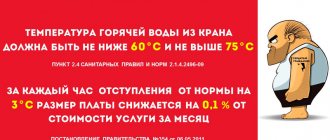Home/Heating rules/Start of the heating season
Every autumn, before the start of the heating season, residents of high-rise buildings experience discomfort because the apartments become cool. There are suspicions that utility companies are delaying the deadlines, wanting to save money. In reality, management companies cannot turn on the heating at their own discretion - there are regulations establishing the timing and procedure for this procedure. One more point: before starting the system, it needs to be tested and repaired - leaks and air locks often occur. It takes time to fix these problems so that there are no problems in winter.
Attention
The decision to turn on the heating is made by local governments, and not by the management company and TSN. The exact date has not been established; the law requires that you be guided by the weather. The heating season should begin if the average daily temperature remains below 8 degrees for 5 days. If the heat supply is delayed, residents have the right to complain to the organization servicing the house, demanding that the problem be solved and at the same time recalculated. If utility workers are inactive, you can contact the Housing Inspectorate, Rospotrebnadzor, or the district Administration.
Normative base
Relations in the field of heating residential buildings are regulated by several regulations:
- Basic Law – Federal Law No. 190 of June 27, 2010 “On Heat Supply”.
- The general rules for heat supply to residential buildings are established in Art. Chapter 7 3 Federal Law No. 416 dated December 7, 2011
- The procedure for providing utility heating services is enshrined in the Rules approved by Government Decree No. 354 of 05/06/2011.
- SANPiN 2.1.2.1002-00 specifies permissible temperatures in apartments during the cold and warm seasons.
Preparing the housing stock for the heating season 2017-2018
The comprehensive preparation of housing and communal services facilities for seasonal operation is regulated by regulatory requirements for people's accommodation in the autumn-winter period.
- elimination of cracks and holes in external walls, basement, attic floors, roof and places where they join each other, windows or doors;
- restoration of plaster coating, roofing, etc.;
- tidying up technical premises;
- checking the integrity of window and door fillings, door closers and vestibules;
- conducting trial fires of central heating and furnaces;
- ensuring the removal of atmospheric and melt water from descents into the basement and window pits;
- checking the quality of waterproofing of foundations, basement walls and plinths;
- checking the performance of heating stoves and installations with gas heaters, chimneys, gas ducts, internal heat, water and electricity supply systems.
Based on these recommendations, as well as shortcomings identified as a result of the spring inspection of the apartment building and its engineering systems, the management company or HOA develops an action plan to prepare for the heating season and approves it with local authorities.
The management company’s preparation plan for the heating season, in addition to technical work, includes a number of organizational measures:
- retraining and advanced training of employees providing operation and emergency repairs of boiler houses, heating points, engineering systems;
- instructing emergency service workers, maintenance workers, and janitors;
- carrying out technical inspection and maintenance of vehicles, communications, equipment, tools, cleaning equipment, inventory;
- preparation or restoration of diagrams of in-house engineering systems;
- carrying out an audit of thermal units, operability of metering devices (with replacement, if necessary), certification of the integrity of seals.
In addition, management companies and homeowners associations, when preparing for the heating season, must take into account other requirements of Rule 103:
- the degree of readiness of heat-consuming installations for operation and their provision of the thermal energy consumption regime specified in the resource supply agreement;
- absence of debt for supplied thermal energy and coolant;
The main problem in preparing for the heating season remains the highest level of consumer debt for supplied energy resources. The debt in the housing and communal services sector amounts to more than one trillion rubles, of which 800 billion are debts of management companies to resource supply organizations.
Mikhail Men, Minister of Construction and Housing and Communal Services of the Russian Federation
In accordance with the Rules for the maintenance of common property in an apartment building (approved by Decree of the Government of the Russian Federation of August 13, 2006 No. 491), responsibilities for preparing in-house engineering systems for seasonal operation are assigned to the owners of residential premises of an apartment building (in the case of direct management) or HOAs and managers companies. Financing of events is carried out at the expense of the owners.
Law on “alternative boiler house”
As for the preparation for the 2017-2018 heating season of the heating network, control over it will be entrusted to new structures - unified heat supply organizations (ETO).
On July 31, 2021, President Putin signed the federal law “On Amendments to the Federal Law “On Heat Supply” and certain legislative acts of the Russian Federation on improving the system of relations in the field of heat supply.”
The document, which received the popular name “The Law on “Alternative Boiler House”” changed the system of regulation of heat tariffs. The new model provides for the establishment of a maximum price level for the coolant, which is called the “alternative boiler house”. This is a calculated figure. It corresponds to the cost of one gigacalorie of thermal energy if consumers want to build their own (alternative) boiler house.
In addition to ensuring the uninterrupted process of delivering heat from the producer to the consumer, ETO will be responsible for the entire range of activities for the construction, reconstruction, modernization of heat supply facilities, as well as for their preparation for seasonal operation.
However, maintenance of intra-house networks, installation of heat meters and preparation of the heating unit for the heating season will remain the responsibility of management companies and HOAs.
When do you turn on the heating?
Government Decree No. 354 sets out the conditions for the start of the heating season. There are 2 of them: first, the average daily temperature outside should drop below +8 degrees, second, this value should last 5 days. Thus, even if the temperature remains abnormally low for 4 days, but warming is promised on the fifth day, turning on the heating will most likely be postponed.
There are no specific dates in the law. However, in fact, the heating season begins in September-October, depending on the region of the country.
At what temperature is the heat supply turned on?
Consumers often ask themselves the question at what temperature should the heat supply be turned on?
The decree of our government dated June 23, 2006, about the procedure for providing housing and communal services to citizens. The very beginning of the heating season is considered when the daily average outdoor temperature is less than plus 8 degrees Celsius for a full five days in a row.
So at what temperature is heat supplied!?
According to the above act, at a temperature less than plus eight and if the temperature is maintained for five days in a row or with the very beginning of the heating period from October fifteenth to April fifteenth.
Also, it will be useful to get acquainted with the temperature standards from the sanitary and epidemiological service, which must be in residential premises:
Very often the heat supply in rural houses is poor. Thanks to this, you need to try traditional country house heating.
Also read: My recommendations for choosing heating pipes
Traditional heating is a good replacement in a private home
How to perform traditional heating? To install traditional heating you will need:
- heating batteries,
- pipes for connecting heating components,
- water boiler
- and much more.
You can purchase all this from our company.
We recommend: Detailed instructions on how to increase the battery
Recommendations and tips
- It is necessary to install water boilers closer to the living space, many people usually install boilers in the kitchen room, some make a specialized extension to the kitchen room, where the boiler is located.
- Based on the above, the boiler in a traditional heating system must be placed below the heat dissipators. This will increase the pressure circulation in the system, which in turn can make your home more comfortable and warmer.
Note on the topic: 5 rules for filling the heating system
What to do if you have problems?
If you have problems with cold winters and low temperatures in your home. If purchasing and installing traditional heating puts you in a difficult situation from which it is difficult to find a way out. Contact the specialists of our company, and they will install heat in your home very quickly and with the highest quality.
Our company is ready to provide all services for carrying out and connecting traditional heating of houses.
Heating turn-on progress
First of all, heating is supplied to social buildings - clinics, kindergartens, schools. Then residential buildings are connected. Heating is started gradually, the whole process is extended over 2 weeks. This is due to the inertia of the system: it is necessary to fill the pipes that supply heat to each house, and this is tons of water that requires pre-heating to a certain temperature.
Additional Information
If you suddenly turn on the heating throughout the city, the load will instantly and greatly increase. As a result, circulation will deteriorate. Unforeseen situations also often arise, despite the long-term preparation of the system. In one place a crack is found in the shut-off valve, in another - problems with the valve. In this regard, plumbers carry out a thorough check after start-up.
Heating in the off-season
The off-season in heating terms is the time between the heat being turned off in the spring and the supply of hot water returning to the pipes in the fall. The weather is unpredictable, so a sharp cold snap can occur at the end of spring. In some regions frosts continue until May.
The state does not have the ability to open and close the dampers of thermal power plants at the request of people. Therefore, under normal conditions it is necessary to resort to additional means of heating the premises. Most often they use electric appliances, less often gas ones.
In some private homes, additional heating is provided using a wood-burning stove and potbelly stoves.
An alternative for multi-apartment buildings is heaters running on liquid fuel, as well as:
- Oil-based radiators and convectors. Cons: high electrical energy consumption. Plus – it heats the room efficiently and maintains the set temperature for a long time after disconnecting from the network.
- Fan heater - quickly heats up the room, but also cools down when there is no power. The main disadvantage is that it dries out the air in the apartment.
- The air conditioning system is expensive, but reliable and long lasting. By installing a “split”, the owner solves two problems. In summer you can set the optimal coolness in the house, and in winter you can warm up (but only when the outside temperature is down to -5°C). Experts recommend choosing energy-saving models to reduce electricity costs.
Please note: installing heated floors in apartments and houses can also solve the heating problem in the off-season.
How to find out the exact start date of the heating season?
The resolution of the district or municipal administration on approval of the heating supply schedule is published online in the public domain. This document can be found on the municipality's website. The resolution is also published in the city newspaper - the official body of local government. Other media are not required to publish the full text, but they always report information about the timing of the heating season. Until the official document is made public, it will not be possible to find out the date of heat supply even by personally contacting the heat supply organization or management company.
What to do if it’s warm outside and the heating is not turned off
It should be taken into account that stopping heating equipment for summer mode cannot be done instantly. The heating is turned off in a certain sequence. First of all, the heat supply to administrative buildings and industrial facilities is stopped. They are followed by residential apartment buildings and only lastly are batteries turned off in schools, kindergartens and other social institutions.
However, there is some injustice in all these decisions. At a time when it is already warm outside and the temperature of the pipeline is reduced to a minimum, residents are forced to pay the heating bill in full. You can find a way out of this situation by installing meters on heating appliances.
It is also possible to turn off the heat individually ahead of schedule. To do this, you will need a collective application and consent of all residents of the house, which is submitted to the organization that supplies heat to your region. Only after this is the shutdown performed.
Actions if you don’t turn on the heating and it’s already cold
Attention
If the heating season has already begun, the first thing you need to do is make sure that all the batteries in the apartment are working properly. If only your home is cold, but your neighbors upstairs and downstairs are warm, the problem may be an air lock. Plumbers will quickly fix it.
The temperature in the apartment is important. According to SanPin standards, in a living room there should be at least +18 degrees, in a corner room +20 degrees. If the temperature in your home is lower, you need to call the emergency dispatch service and leave a request to solve the heating problem. Within one or two days, the cause of the malfunction must be found and eliminated, as well as notifying you about it.
You also need to demand that a representative of the management company come and record the fact that the batteries are not working and the temperature is low. The drawn up act will become the basis for recalculating the cost of heating and will serve as evidence that, if necessary, can be attached to the complaint.
Reasons for untimely start of the heating season
It would seem that with such good legislation and the responsible attitude of public utilities to their responsibilities, there is no reason to doubt that heating in our apartments will be turned on this year. Why do particularly impressionable citizens regularly annoy officials with numerous complaints and incomprehensible questions about how they are supposedly freezing and when they will turn on the heating?
Unfortunately, there are plenty of reasons to doubt the timeliness of heat supply; I will list only a few:
An ordinary bungling superimposed on force majeure circumstances. An example from the Vologda region, where an entire village was left without heating in November 2021. The reason is that the local boiler house was unable to supply fuel due to washed out roads. According to the logic of local authorities, in order to deliver fuel, the soil needs to freeze for 2 weeks at minus 10-15°. This is such a vicious circle, it turns out that in order to warm up, you first need to freeze.
Such cases, despite their absurdity, often happen every year and there is no complete certainty that something similar will not happen next year in your city, with your home.
If you strictly follow the fifth point of the mentioned resolution and the unpredictable vagaries of the weather, then the supply of heat, on completely legal grounds, will easily be postponed to the beginning of November. For example, the air temperature in Perm on October 16, 2021, day and night was +10 degrees, although on September 11 at night it was +3°, and if the Perm authorities had strictly followed the instructions, and not common sense, then the Perm residents would not have received warmth in their apartments until 23 October.
There are often cases when during the so-called preparatory period, no one prepared anything, and winter came, somehow again unexpectedly. Sad but true! An emergency patching of problem areas begins, searching for resources for which there are no resources in life, but gradually everything, in some miraculous way, returns to normal. But the citizens had to freeze once again for a month or two, but these are the costs of the harsh Russian climate.
It is easiest to scold officials from housing and communal services; they are almost ethereal in their inaccessibility and isolation from the needs of the administration, but most often the reasons for poor-quality heat supply are much closer and in order to solve them it is not necessary to communicate with the President. The goodwill of the residents of the house and the willingness to fix the problems on their own are enough.
Technical problems with heating
Low intra-system pressure and, as a result, poor coolant circulation. The malfunction occurs due to increased hydraulic resistance of the system, or, more simply put, clogging of pipelines, filters, and shut-off valves.
- Periodic airing. It is possible that the cause of such a malfunction was laid down at the design stage or was admitted during installation work.
- Insufficient coolant temperature. Most often, temperature loss occurs due to insufficient thermal insulation of the heating main, but it may very well be that the thermal load on heating was initially calculated incorrectly.
- Imbalance and improper adjustment of the heating system.
Not all problems with heat supply are related to the depletion of the resource of the in-house heating system. Sometimes, the culprits for problems are the residents of the house themselves. Or rather, only part of them. Particularly advanced citizens consciously or unconsciously change the design of the system, disrupting the uniform distribution of heat on all floors. Here are typical examples of homemade products:
- Increasing the number and (or) area of radiators.
- Connection of additional heating devices. Water heated floor, indirect heating water heater.
- Installation of an additional radiator for heating a balcony, loggia.
When can you complain about turning on the heating late?
Nothing can be done before the official start of the heating season. The management company launches the system in accordance with the deadlines established by local authorities and has no right to violate them. If the deadline for turning on the heating has already passed, but the house is still cold, you need to call your management company or heating supply organization and ask when the heating will be turned on. If you are not given a clear answer, you should file a complaint.
When will heating be provided in 2021 in Moscow this year the heating season will begin in October
There are certain instructions, following which housing and communal services begin the heating season. There are certain regulations according to which heat in homes must appear before October 15 inclusive. There is also a list of institutions (for example, municipal buildings, schools, kindergartens, hospitals, etc.) in which the heating starts earlier than the established deadlines. Also, utility workers are guided by the basic principle, that is, they turn on the heating if the daily temperature remains for five days at or below plus 8 degrees Celsius.
With all this, one prescription contradicts the other, because if after October 15 the air temperature is above plus 8 degrees, the heating will not be turned on for now, since this is not profitable for service providers.
Also, utility companies are required to supply heat to our homes on behalf of the city mayor, as happened last year in 2021
If we take into account the statistics, the heating season in the capital begins from October 1 to October 15. A little earlier than this period, municipal institutions begin to receive heat, and after them administrative buildings
Step-by-step instructions for filing a complaint about late heating switching on
A complaint about turning on the heating late is written in free form; there is no standardized template. Typically the document is drawn up as follows:
- In the upper right corner, the applicant indicates his personal data and the name of the organization to which the complaint is being filed. You must leave a telephone number where you can be contacted in order to resolve the issue peacefully.
- Then the problem encountered is described in detail. You should list the measures that you managed to take before filing a claim - where you applied, who you talked to. Make a list of documents attached to the complaint, if any.
- The next block lists the requirements. Write that you will go to court if measures are not taken.
- At the bottom is today's date and signature.
Attention:
The complaint about the late switching on of the heating in the apartment must be made in two copies. One is handed over personally to an authorized employee of the management company, TSN or heat supply organization, if the contract is concluded with it directly. The second copy, with a receipt mark, is kept by the applicant. If a claim is refused, you can send it by registered mail or electronically on the organization’s website.
You can file a complaint for late heating switching on here.
Ways to heat your home in the off-season
Fan heaters allow you to quickly heat even a large room, and at the same time they consume a small amount of electricity. Since they do not take up much space, they are convenient to store when not needed, even in a small apartment. However, it must be taken into account that their use worsens air quality - due to oxidation of the spiral material and dust combustion, the oxygen content decreases (pro
Considerations and possible consequences
The management company is obliged to consider the claim to turn on the heating of an apartment building within 10 days and take appropriate measures. Based on this act, it will be possible to request a recalculation of the heating payment for the entire period when there were problems with it. For each hour that the temperature does not meet the established standards, the heating fee is reduced by 0.15% of the monthly payment. Therefore, the management company is interested in quickly establishing heat supply to the house.
If the situation does not change, you should file a complaint with Rospotrebnadzor or the prosecutor's office. If departments fail to act, you can file a lawsuit with a demand to oblige the management company not only to recalculate heating fees, but also to compensate for moral damages. The court decision is executed in 95% of cases. If this does not help, the residents of the house should hold a general meeting and discuss the issue of changing the management company or organizing TSN. This will be possible if the majority of owners vote for such a decision.
Is it possible to turn off during the heating season?
Accidents on heating mains are not uncommon. Such force majeure, as a rule, entails the shutdown of hot water supply and heating. The legislation provides for standards for one-time shutdown of heating, which must be observed.
Standards for turning off heating during the season:
| Room temperature in °C | Shutdown time in hours |
| +12 | 16 |
| +10 to +12 | 8 |
| +8 to +10 | 4 |
Important! If the apartment owner proves that the temperature in the room does not meet the approved standards, he may demand financial compensation in the amount of 0.15% of the monthly heating fee for each hour of violation.
How to heat an apartment in the off-season
It may take a long time before the average daily temperature reaches the conditional level at which the management company is obliged to turn on the heating. In autumn, the sun does not warm up the walls much, and with the onset of darkness they quickly cool down, sucking the heat out of the room. You can heat the apartment while waiting for the central heating to start using additional equipment:
- oil radiator;
- fan heater;
- air heating unit.
Double-glazed windows or inexpensive, but quite effective, sealing of windows for the winter will allow you to retain heat.
What to do if there is no heat in the apartment
After the onset of winter cold, the temperature of living quarters should not fall below +18 °C. If the heating system cannot provide the temperature regime specified by GOST, the owner must immediately notify the emergency dispatch service of the presence of violations. Applications can be accepted by telephone or in person. In both cases, the dispatcher is required to provide his details and record the time the complaint was received.
Upon request, an examination is carried out. If the owner of the apartment has not determined his time for carrying it out, then the inspection is carried out within two hours after receipt of the application.
Based on the results of the inspection, a report is drawn up containing the following information:
- measurement methodology;
- tools and devices used;
- identified violations or the absence of such violations;
- date and time of the inspection.
If the results of the inspection by the management company do not satisfy the owner, he has the right to request a re-examination with the participation of members of the State Property Committee and the public association of consumers.
How to determine the average daily temperature
The average daily temperature is defined as the arithmetic mean of all measurements taken over 24 hours. To calculate it, you need to do the following:
- take air temperature measurements at intervals of 4 hours (the interval can be any);
- add all values;
- divide the resulting amount by the number of measurements.
The result will be the average temperature for the day.
Where to complain if batteries stay cold
In the event of a lack of heat, apartment owners can file a complaint with one of the organizations responsible for maintaining the building:
- management company;
- housing and communal services service or RSO;
- housing inspection.
If contacting local authorities does not bring the desired result, it is necessary to file a formal complaint with higher authorities:
- local administration;
- Rospotrebnadzor;
- the prosecutor's office;
- court.
Official requests can be left on the websites of the above organizations.
Nuances
Although the law requires that the timing of the heating season be determined by local authorities, there are still opportunities to deviate from this norm. If the communications are in order and checked for leaks and other faults, the management company can start supplying heat without waiting 5 days with an average daily temperature of less than +8 degrees. This is also allowed based on numerous requests from residents.
There are several other important nuances associated with the start of the heating season:
- Supplying heating later than 5 days with an average daily temperature below +8 degrees is a direct violation of the legislation of the Russian Federation. For this, organizations that provide such a service face serious fines.
- If apartment owners believe that the heating is turned on too late, they have the right to enter into an agreement with the heat supply organization. You can enter the exact dates of switching on and off. Then heating will be supplied at the specified time without taking into account the outside temperature. However, it is necessary to organize a meeting of residents and ensure that the majority of residents express their consent in writing. This can be difficult to do.
- If the heating has already been turned on, but the house is still cold, you should not complain right away. The system is adjusted by increasing the pressure gradually. Therefore, it sometimes takes several days for the batteries to become hot.
- It is forbidden to unauthorizedly weld pipes or install radiators with a large number of sections to make it warmer. This allows you to make the temperature of the house more comfortable, but may disrupt the operation of the heating system. Residents of other apartments will suffer - it will become cooler for them. Therefore, after some time, the relevant services will learn about such a violation. The owner will be fined and will still be required to return the old batteries.
Comments Showing 0 of 0
Scarce gas from Europe may leak to Ukraine
According to government decree No. 354, or rather the fifth paragraph of its second article, heating in Russia must be turned on if the average daily temperature in the region remains below +8 °C for five days in a row. And vice versa - turn it off if the window outside is warmer than this mark.
So it's pretty simple. If the temperature is above or below eight degrees, the authorities issue an order - and the heating supply is started or stopped. But in fact, it often happens that officials start the heating season earlier - usually “due to numerous requests from citizens.” In addition, in many cities, residents pay for heating all year round, so the financial factor should not play a serious role.
How is the average daily temperature calculated?
Everything is simple here too. Let's take the example of Moscow. The hydrometeorological center or any weather center records the air temperature determined by their weather stations every hour during the day. This results in 24 indicators in 24 hours. All indicators are then summed up, and the resulting number is divided by 24. That is, if, for example, on some May in the capital the temperature ranged from +4 to +8, which is not uncommon now, the average value will be approximately +6, for this you don’t even have to go too deep into calculations.
Is it difficult to start the heating system again?
It varies in different regions, but this cannot be done instantly almost anywhere. In Russia, with its central heating systems dating back to the 70s and 80s of the last century, boiling water travels quite a long way before reaching an ordinary apartment. From the thermal power plant it goes to heating points, where it mixes with cold water, heats it up, and then it is sent to the heating units of houses, they are usually located in basements. These units, as a rule, contain thermometers that can regulate the temperature supplied to the batteries to the desired level. If they are not there, all this is done manually by specialists. And at each stage, time is required to preliminary check the networks, otherwise leaks or breakthroughs can lead to disastrous results.
In the capital, where heating mains are regularly repaired and checked, and the operation of thermal power plants is fairly well automated, the process of starting heating before the winter cold usually takes up to five days. And in Khabarovsk, for example, it’s twice as much. Moreover, apartment buildings are usually the last in line, followed by schools, kindergartens and hospitals.
About this theme
|
Taking into account the fact that in a number of regions like Moscow and the Moscow region the heating season ended just a week ago, the risks from a sudden start-up are certainly lower than after a summer downtime, and systems can be restarted faster. Energy workers in the Moscow region, for example, say that it only took them a day. In Moscow, one can assume, the deadlines will be no longer.
Should you turn on the heating now?
If we talk about Moscow and proceed from the norm above/below +8°C, then the situation here is borderline. On the one hand, five days below +8°C in the capital, if they have not yet passed, are about to accumulate, and on the other hand, serious and long-term warming is expected from Monday, May 25. The Moscow region authorities didn’t think twice about it and turned on the heating on the 20th.
Meanwhile, every day without heat can worsen the situation with COVID-19, virologists say.
“It’s no secret that during constant hypothermia a person is most susceptible to viruses. Now more and more latent coronavirus patients are beginning to be identified. That is, patients with latent infection. This course of the disease is mutually beneficial, since a person develops so-called non-sterile immunity, and the virus has a place to live, due to which it does not kill the body. Now the immunity of latent patients contains the virus, but as soon as it weakens, symptoms will appear. And this means that the load on the body will be greater, and there is a risk of moving into the category of moderate and severe patients,” virologist, head of the microbiology department of latent infections at the Gamaleya National Research Center for Epidemiology and Microbiology, Viktor Zuev, told the newspaper VZGLYAD.
Watch even more videos on the VZGLYAD YouTube channel
Legislative framework on turning off and on heating in an apartment
The regulatory framework for the heating regime in apartment buildings is compiled in GOST 30494 of 2011 (latest edition 2021). The document reflects the required water temperature in the heating system.
The beginning of preventive work on heat supply utilities is enshrined in Federal Law No. 190/FZ of July 27, 2010, with the latest amendments in 2021. The law outlines the area of responsibility of utility structures serving apartment buildings.
Issues regarding current repair work of main and additional water heating systems are disclosed in RF PP No. 354 (with the latest amendments in 2021). In addition, there is a clear list of force majeure situations when it is permissible to suspend the supply of heat to residential premises.
SNiP
The collection of legislative acts that regulate construction standards is called SNiP. According to SP 60.13330.2012 SNiP 41-01-2003 and SP 60.13330.2016 SNiP 41-01-2003, residential premises should be equipped with ventilation, heating and air conditioning.
In accordance with SP 131.13330.2012 SNiP 23-01-99, when constructing apartment buildings and individual residential premises, construction climatology must be taken into account.
SNiP 41/01/2003 dated 2004 indicates mandatory compliance with temperature levels in heating radiators.
GOST
To understand what the heating temperature in the apartment should be, you need to familiarize yourself with the regulatory documents on the current standards.
- GOST 55656/2013 came into force on July 1, 2015. The position indicates the energy characteristics for different rooms. An example of calculating the required energy for heating buildings is also given.
- Order of Rosstandart No. 1211 of October 25, 2013 approved nationwide standards for metrology and technical regulation.
How to determine the average daily temperature
To determine the average daily temperature, it is enough to add the air temperature outside at one point at a certain interval per day. For example, if you change every 6 hours and the first measurement is taken at 6 a.m., then subsequent measurements should be taken at 12, 18 and 24 hours. Next, we sum up the obtained values and divide by their number, in this case 4. The more often the measurements are taken, the more accurate the result will be. There can be two minimum values - the maximum temperature during the day and the minimum temperature at night.
Temperatures in Moscow during the day, at night and average daily for the next few days:
If the temperatures have long been consistent with the established standards, and the management company does not turn on the heating and does not respond to your requests, you can complain to the management company; in Moscow there are several authorities for this.
Preliminary work
Winter comes every year, but for utility workers it is always a surprise. In accordance with PP No. 354, the management company and RSO must carry out preventive work on utility networks before the start of the heating season.
Beginning and end of the heating season
The beginning of the period for supplying heat to apartments depends on the subject of the Russian Federation. The resource must be included in homes according to the law from October 1 to October 15. Heating works are completed from early April to mid-May.
Rules
According to the law, the management of the local municipality must agree on the start and end dates of the heat supply period with higher authorities. At the same time, the average temperature at which heating is turned on is +8°C.
CHP and utility services are responsible for maintaining the required level of resource in residential apartments. The table shows the standards:
Table 2.
| Type of heated room | A standard below which the temperature inside a property should not fall. Condition – the room is thermally insulated. |
| Apartment in MKD, private house | 18-20 °C. If the street is below -30°C, then the indicator increases by 2° |
| A room where people work | 20 °C |
| School classrooms | 18 °C |
| Playrooms in kindergartens | 22 °C |
| Bedrooms in preschools | 19 °C |
| Entrances, corridors, staircases in apartment buildings | 16 °C |
Features of the regions
Due to the fact that Russia occupies a large territory and is located in several climatic zones, it extends far to the north. Of course, weather conditions vary, so the final decision on heat issues in a particular region lies with the local municipality.
For example, this year the heat supply was stopped:
- in Moscow it was switched off on 04/26/2019;
- Tule – 04/28/2019;
- Yaroslavl – 04/24/2019;
- Tver – 04/29/2019.










